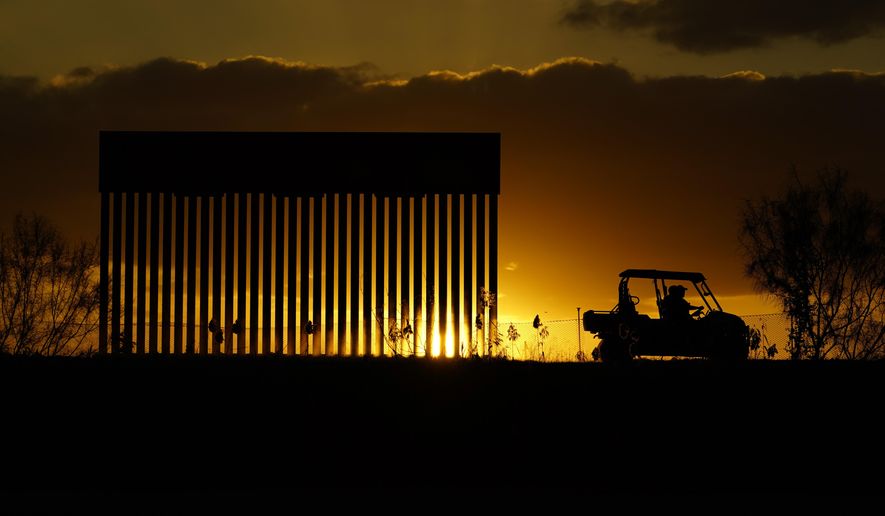President Biden’s decision to halt border wall construction has left parts of Arizona so dangerous that the U.S. Forest Service has banned its employees from going there, according to a border rancher who grazes cattle on those lands.
Jim Chilton, whose ranch covers 5½ miles of the border, was thrilled when the government began replacing the four-strand barbed wire fence with a Trump-style border wall. Five miles were completed by the end of the last administration. But after Mr. Biden halted construction, Mr. Chilton now has a half-mile gap, and people are pouring through like a funnel.
“Actually, the border danger is far worse than it has ever been,” Mr. Chilton told The Washington Times in an email. “The border wall got partway across our ranch but left about a half-mile-wide door for cartel operations right up our southern pastures. Mainly drug packers cross our ranch.”
The Forest Service knows it’s worse. Mr. Chilton said in court documents that employees have been banned from making the rounds of the grazing lands near the border.
“I have attempted to make appointments for the U.S. Forest Service to send personnel out to conduct such monitoring, but these appointments have been canceled due to their reaction to the violent danger near the border where the wall is not complete,” Mr. Chilton said in his sworn statement.
The rancher maintains his own motion-activated cameras on his grazing land and said they have detected “a dramatic increase” in the number of people coming across since wall construction ended.
The Forest Service, citing the ongoing court case, declined to comment on Mr. Chilton’s revelation, but a spokeswoman insisted the agency is “working with several local and federal agencies to ensure safety of the public and employees as we accomplish work to support healthy, resilient landscapes.”
Arizona’s lawsuit, led by Attorney General Mark Brnovich, argues that the increase in traffic is tied to the halt in construction and has resulted in illegal immigrants “trampling upon wilderness.” That endangers the fragile desert ecosystem and amounts to a violation of the National Environmental Policy Act, Mr. Brnovich said.
Under his grazing permit from the Forest Service, Mr. Chilton is supposed to move cattle from pasture to pasture to reduce environmental impact. But the border is so dangerous that it is “seriously impacting” his ability to move the cattle to winter pastures, he said.
Homeland Security Secretary Alejandro Mayorkas signaled early this year that construction could be restarted to fill gaps in the wall, but he seems to have soured on the idea. He said the administration’s policy is no more construction.
Homeland Security canceled outstanding contracts for construction this month.
Republicans on Capitol Hill told Mr. Mayorkas in March that Border Patrol agents say they want the wall built. The secretary replied that was “not the response of the United States Border Patrol with unanimity.”
Mr. Biden’s pick to lead Customs and Border Protection, Tucson Police Chief Chris Magnus, seemed to disagree with his boss. Chief Magnus told Congress last week that agents do want more wall, and he tends to agree.
“I think there are some gaps where that could make sense,” he told senators in a confirmation hearing.
The Times reached out to Customs and Border Protection for comment.
Environmental groups say the issue isn’t too little wall, but rather too much.
A coalition of groups in February developed a list of locations, spanning dozens of miles, where they want to see the wall system dismantled and the grounds restored.
The environmental impact of illegal border activity has been debated for years. Both sides are increasingly turning to the courts to settle the matter.
Environmental groups filed multiple lawsuits to try to stop President Trump’s construction, and now states are battling Mr. Biden to restart it.
Texas and Missouri filed lawsuits last week to demand a return to construction.
In the Arizona case, Mr. Brnovich says it’s not just the physical wall that has been halted. The Trump team was constructing a “wall system” with roads, sensors and lights to accompany the fence, all to give agents better accessibility and awareness to be able to respond to breaches. Mr. Biden’s halt to construction put a stop to all of it.
Because the Trump team front-loaded construction of the barrier and intended to fill in the roads and technology later, there are places where the fence is up without the other defenses.
Sheriff Mark Dannels in Cochise County, to the east of Mr. Chilton, told the court there are places where paths had been cleared for road construction, but the all-weather road never got laid because of the Biden work stoppage.
Those construction roads flood and become impassable, “making law enforcement patrol of certain border areas impossible at times,” the sheriff said in his sworn statement. Drug cartels take advantage of those chances to surge their product over the border, he said.
Unfinished floodgates have also become “popular points” for smuggling people.
All of that means more human waste, trash and other contaminants damaging the environment, the sheriff said.
He said finishing the border wall in the Nogales area of Arizona would be “highly likely to reduce the volume and ease of illegal traffic.”
“Overall, the unfinished state of the border wall project has contributed to increased illegal traffic across the United States-Mexico border and the negative environmental impacts that come with it,” he said.
• Stephen Dinan can be reached at sdinan@washingtontimes.com.




Please read our comment policy before commenting.